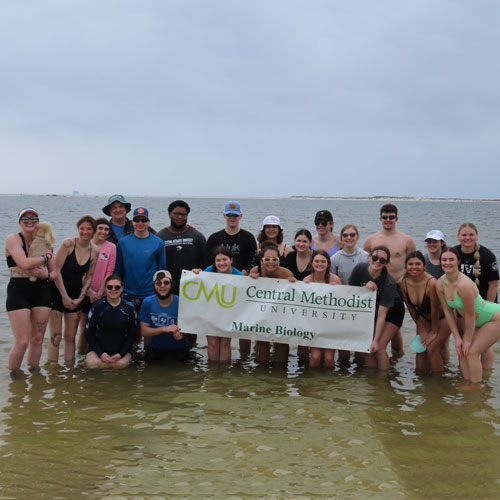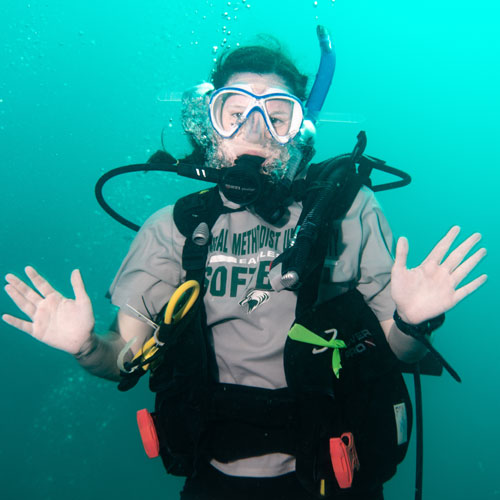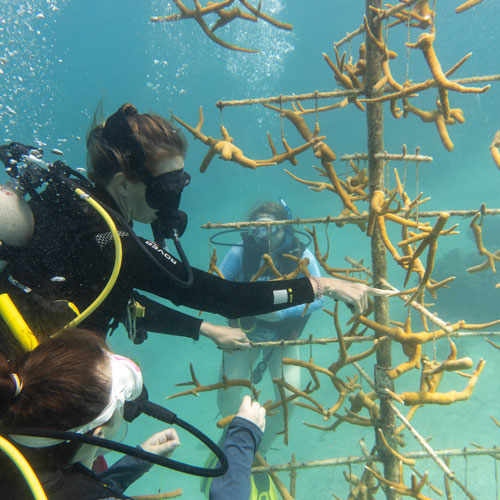Marine Biology Trips
This major prepares students for graduate school in marine biology or to work as a marine biologist. Opportunities include research in aquaculture, biodiversity, ecology, education, fisheries, pathology, invertebrate zoology, and toxicology. Combined with a basic background in general biology, marine biology is essential for continued monitoring of marine organisms and environment for recreation, biodiversity, and food production.
See for yourself, take a look at our most recent trip albums:
Panama City 2023 Roatan 2022 Previous years
 Dauphin Island, Alabama
Dauphin Island, Alabama
The field experience to Dauphin Island, Alabama is the first trip marine biology students at CMU take. To go on the trip, students must be enrolled in (or have previously taken) the correlating course; BI230 – Dauphin Island Biodiversity/Toxicology. The course and trip operate in conjunction with each other and allow students to gain an introductory knowledge base of marine ecosystems and fisheries surveying techniques. Throughout the field experience, students collect juvenile fish species and invertebrates in three main ecosystems: sandy beaches, rocky shores, and mud flats/estuaries. With the collected species, students spend their evenings honing their identification skills by using identification guides to properly name their collected catch. Resources from the Dauphin Island Sea Lab are also utilized to enhance the education experience.
Students also participate in a long-term study focusing on the impacts of the Deepwater Horizon Oil spill by collecting bean clams (Donax variabilis) and mole crabs (Emerita portoricensis), two species that are commonly found in the surf and swash zones and are good indicators of ecosystem health. The number of bean clams and moles crabs collected are compared to sample numbers from previous years. Students then utilize the data to draw logical conclusions as to whether the oil spill is still impacting the Gulf ecosystem.
 Panama City Beach, Florida
Panama City Beach, Florida
The excursion to Panama City Beach, Florida is the second trip students take during their marine biology studies and is truly marine biology centered. Students become fully immersed within the realm of marine biology as they put their new SCUBA and snorkeling skills to the test. During this week-long adventure, students will spend time diving and observing the marine ecosystem of the Gulf of Mexico. Spending so much time in the water, students are allowed the space to become more comfortable and hone their SCUBA diving skills.
They are also given the opportunity to use diving-specific collection techniques and underwater photography to study reef organisms and the ever-changing coastal environment. With collected specimens, students learn about the importance of establishing transport aquariums and the technology used in the process. To participate, students must have successfully taken the on-campus course BI240 – Marine Biology. The course covers oceanography, marine chemistry, and botany and introduces invertebrate and vertebrate zoology and emerging fields in marine biology.
*Students become SCUBA certified prior to the trip
 Roatan, Honduras
Roatan, Honduras
Roatán, Honduras is the third trip offered within the CMU marine biology program. Students spend most of their time on this week-long excursion practicing scientific diving skills by participating in coral reef restoration and mitigation. Through a partnership with Bay Island Reef Restoration (BIRR), CMU marine biology students learn how BIRR utilizes underwater coral trees and other techniques to grow fragmented staghorn coral (Acropora cervicornis) and elkhorn coral (Acropora palmata). Fragments are then outplanted on the surrounding reef to help establish new, protective coral colonies. In addition to learning more about coral reef reestablishment, students spend time ensuring that coral trees are free of algal growth and hitchhikers, collecting data on coral fragment health, and attaching new coral fragments to trees.
Before the trip, students will take the course BI310 – A Field Study on Coral Reef Restoration to better understand the current restoration and mitigation methods used by BIRR. Students also investigate techniques used worldwide to keep on the cutting edge of coral reef restoration.
*Students become SCUBA certified prior to the trip

